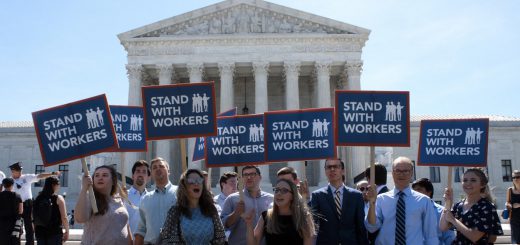The Democrats Presidential Primary: A Look at Pro-Union Candidates

Ken Green
CEO/Founder
UnionTrack, Inc.
The 2020 presidential election will be crucial for the labor movement. Though he courted working-class voters during his campaign for the presidency, and won the support of many of them, President Trump and his administration have been steadily working to erode the strength and relevance of unions and the rights of workers.
“He has not fulfilled many of his campaign pledges and, in fact, he’s attacked many of the institutions that are important to labor,” says Ken Sagar, president of the Iowa Federation of Labor, AFL-CIO.
To turn the tide, unions will need an ally in the White House.
Here is a brief look at the pro-labor Democratic candidates and how they say they will address workers’ needs. And courting unions is a key tactic for most of them. The majority of these candidates have a favorable view of the labor movement and are communicating a pro-worker agenda.
That said, labor leaders and union members will need to sift through a lot of information to find the candidate who aligns with their vision for the future.
“The path to the nomination and the White House runs through the labor movement,” says Richard Trumka, president of the AFL-CIO. Trumka says unions are looking for a candidate who “has more than platitudes” on the labor movement and genuinely puts workers first.
Here’s a look at the front-running Democratic candidates, as determined by the September debate and listed here alphabetically.
Joe Biden
Former Vice President Joe Biden is no stranger to unions and workers’ issues. “I make no apologies. I am a union man,” Biden declared during his presidential campaign kickoff at a Teamster’s union hall in Pittsburgh.
As a senator, he supported the Employee Free Choice Act, which would have made it easier for workers to unionize. As a candidate, he supports a $15 minimum wage and making it easier for workers to form unions. His pro-labor stance made him the first candidate to receive an endorsement from a union, the International Association of Firefighters (IAFF).
“He knows that a strong middle class means a strong America, and we know as president, he will stand up for all the patriotic Americans who want nothing more than to earn a decent wage, send their kids to college, have affordable health care and a decent and secure retirement,” IAFF President Harold Schaitberger says of Biden.
Cory Booker
New Jersey Senator Cory Booker has a progressive record on workers’ issues. As a senator, he has advocated for a $15 minimum wage and supported bills that would make it easier for workers to unionize — bills that include those for the Workplace Democracy Act and the Protecting the Right to Organize Act.
His Worker Dividend Act seeks to push companies to pay workers a share of the money when organizations buy back their own shares. “Massive corporations are profiting to the tune of billions of dollars and are still not providing livable wages for workers,” Booker says.
As a candidate, he has laid out a pro-labor platform called Opportunity and Justice for Workers. It is a comprehensive look at the issues he believes need to be tackled for workers, including ensuring all workers have opportunities for better wages, expanding investment in industry-specific and organizational training, and making childcare available for workers.
He is also one of four Democratic candidates whose campaign staff have organized.
Matthew Yglesias at Vox wrote in early 2018 that Booker has reinvented himself as a “populist crusader” who is forcing the issue of “how corporate concentration can harm workers.”
Pete Buttigieg
Pete Buttigieg, the mayor of South Bend, Indiana, is a staunch labor advocate who has laid out a comprehensive platform that addresses many worker’s issues. “While Mayor Pete’s plan is extremely detailed the main point is that he wants to create an economy that works for all working Americans,” stresses Brian Young, staff writer at UCOMM Blog.
In his plan, Buttigieg touches on paid parental leave, minimum wage, sectoral bargaining and the unionization of gig workers. He also wants to fine organizations that interfere with union elections, which would help ease the path to unionization for many.
He is a vocal advocate of the Fight for $15 and building stronger unions. “We need to raise the minimum wage to $15 and rebuild union membership for an economy where all workers can thrive,” says Buttigieg.
The candidate has made a sincere effort to appeal to workers, often joining them during strikes or on picket lines to stand in solidarity.

Julian Castro
“It’s simple—We can’t be 100 percent committed to supporting workers without practicing what we preach,” asserts Julian Castro, the former secretary for Housing and Urban Development.
Castro voluntarily recognized the organization of his campaign staff. Castro has also put himself on the front lines of the labor movement, marching with fast food workers in Durham, North Carolina, as they demanded a $15 wage. He also met with striking medical workers at the University of California.
While he does advocate for addressing issues important to workers, he hasn’t yet released a detailed plan on how he would tackle those issues. According to Politico, he wants to raise the minimum wage to $15, as well as expand paid family and medical leave plans to help working families. He has also proposed a credit, called Working Families First, that includes a universal child credit of $3,000 for “every family of modest means.”
Kamala Harris
California Senator Kamala Harris is no stranger to workers’ causes, and unions have long supported her political career. The National Union of Healthcare Workers (NUHW) has endorsed her multiple times. “She’s extremely responsive to workers’ issues, union issues,” says NUHW President Sal Rosselli.
“Unions built the middle class of this country,” Harris herself says. “We are better than this. This is a moment that is requiring us to fight for the best of us of who we are, and who but labor knows how to fight, and fight effectively,” she exclaims.
As a senator, she has supported the Workplace Democracy Act, which would make it easier for workers to organize. She has also thrown her support behind the Fight for $15. But where she stands out is through her targeted support of public school teachers, domestic workers and farm workers.
To that end, in 2019 Harris introduced the Domestic Workers Bill of Rights in the Senate. “This will provide us with the respect, dignity, and recognition that we all deserve,” says June Barrett, a home health aide who has been campaigning on behalf of the National Domestic Workers Alliance.
Amy Klobuchar
As part of her appeal to workers, Minnesota Senator Amy Klobuchar stresses that she comes from a union family — granddaughter of a union miner and daughter of a union teacher and a union newspaper man. “I come from a union family and I will always fight for our workers,” Klobuchar says.
In her plan of executive actions that she would take in her first 100 days as president, Klobuchar says she would make it easier for workers to join unions and include actions that would address key worker and union issues. Some of those actions include:
- Requiring federal contractors to pay a minimum of $15 per hour to employees.
- Reinstating the joint-employer rule to the Obama-era standard.
- Restoring a rule that requires companies to publicly disclose when they hire union-busting companies to fight workers’ unionization efforts.
Beto O’Rourke
Former Texas Representative Beto O’Rourke is campaigning on a strong pro-labor platform.
In August 2019, he released A 21st Century Labor Contract that details the issues and solutions he proposes to strengthen unions and workers’ rights. Some of those details include:
- Passing nationwide laws that allow all government workers, farm workers, frontline supervisors and independent contractors to unionize.
- Changing the classification of gig workers to employees as opposed to contractors.
- Setting up wage boards that would work to improve wages, benefits and working conditions for workers.
He is also a vocal supporter of the Fight for $15 and the Protecting the Right to Organize Act.
No stranger to appealing to unions and workers, O’Rourke was able to win the endorsement of the Texas AFL-CIO in his 2018 senatorial campaign. He has joined in solidarity with workers fighting for a higher minimum wage, stressing the importance of unions and fair conditions for workers.
“At a time when unions are under attack, let’s not forget that they are the backbone of our workforce and essential to making our economy work for all,” O’Rourke says.

Bernie Sanders
It’s no secret that Vermont Senator Bernie Sanders is a supporter of unions and the labor movement. “In my view, there is really no way the middle class in this country is going to grow unless we build the trade union movement,” says Sanders.
He has been a vocal advocate for workers’ rights his whole political career. In every congressional session since 1992, he has introduced the Workplace Democracy Act. Sanders has marched beside workers during numerous strikes and protests over the years to demonstrate solidarity. His is also one of the four Democratic presidential campaigns to have a unionized staff.
“We believe in labor as a core principle of how we exist as a campaign,” says Ari Rabin-Havt, Sanders’ deputy campaign manager.
Sanders’ labor platform, The Workplace Democracy Plan, aims to ensure a $15 minimum wage for all employees of federal contractors, allow government employees to unionize, make it easier for workers to strike and prohibit employers from firing workers unless there is “just cause.”
Sanders has expressed the desire “to create the strongest trade union movement in American history.”
Elizabeth Warren
Elizabeth Warren, a pro-labor senator from Massachusetts, launched her campaign at the site of the 1912 Bread and Roses textile strike in Lawrence. Warren has said she wants a labor leader to serve as her labor secretary and has voluntarily recognized her unionized staff.
“Every worker who wants to join a union, bargain collectively, and make their voice heard should have a chance to do so,” Warren says.
To do this, she has proposed a progressive trade plan, the Plan for Economic Patriotism, that addresses labor, environmental and anti-corruption legislation, and the flight of American manufacturing jobs.
She has also proposed the Accountable Capitalism Act, which would let workers elect 40 percent of board members of large American corporations. She also seeks to increase spending on federal apprenticeship programs and create a Department of Economic Development to focus on investments in rural areas.
As a senator, Warren has a proven track record of advocating for the labor movement, supporting the Protecting the Right to Organize Act and the Raise the Wage Act, among other pro-union legislative initiatives.
Andrew Yang
Entrepreneur Andrew Yang is attempting to appeal to workers more than unions. He hasn’t yet specifically addressed unions, but has issued platform points that seek to help workers and build the economy.
“We need to evolve and build an economy that works for people,” says Yang.
His strongest campaign point is the Freedom Divided, a universal basic income program that he stresses will be a boost for America’s workers. He suggests that such a program would increase workers’ bargaining power by helping those on strike to hold out longer. Beyond a universal basic income, Yang is also a supporter of pay equality and paid time off for everyone, including six to nine months of paid family leave.
As union leaders decide whom to endorse, they can use UnionTrack’s ENGAGE to communicate with each other and their memberships to gain a consensus of which candidate’s plans best align with their unions’ goals.
Images by: nobilior/©123RF.com, Andrea Izzotti/©123RF.com, Jan Hanus/©123RF.com







